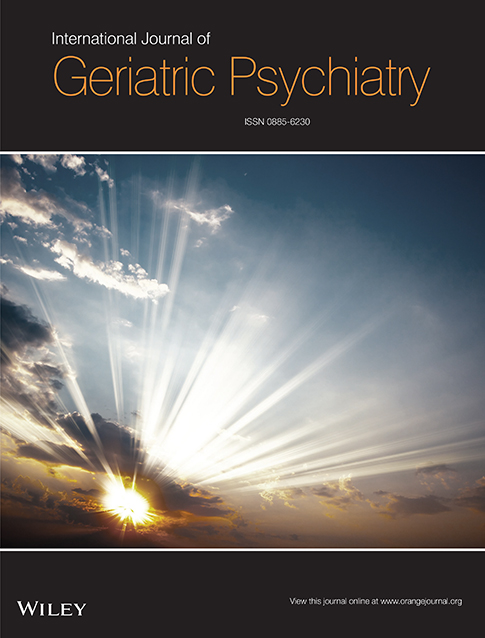Age and the effects of ect
Corresponding Author
Dr. Andrew M. Wilkinson
Senior Registrar in Psychiatry, Fazakerley Hospital, Liverpool, UK
Senior Registrar in Psychiatry, Clatterbridge Hospital, Clatterbridge Road, Bebington, Wirral L63 4JY, UK. Tel:051 334 400Search for more papers by this authorDavid N. Anderson
Consultant Psychiatrist, Fazakerley Hospital, Liverpool, UK
Search for more papers by this authorStephen Peters
Registrar in Psychiatry, Leighton Hospital, Crewe, UK
Search for more papers by this authorCorresponding Author
Dr. Andrew M. Wilkinson
Senior Registrar in Psychiatry, Fazakerley Hospital, Liverpool, UK
Senior Registrar in Psychiatry, Clatterbridge Hospital, Clatterbridge Road, Bebington, Wirral L63 4JY, UK. Tel:051 334 400Search for more papers by this authorDavid N. Anderson
Consultant Psychiatrist, Fazakerley Hospital, Liverpool, UK
Search for more papers by this authorStephen Peters
Registrar in Psychiatry, Leighton Hospital, Crewe, UK
Search for more papers by this authorAbstract
The relationship between age and the outcome of ECT was prospectively studied in 78 patients with DSM-III-R major depression with melancholia or psychosis. Sixty-eight patients were similarly evaluated for change in cognitive performance before and after treatment. Strongly positive correlations between increasing age, response to ECT and improved cognitive function were demonstrated and emphasize that ECT remains an important treatment for depression in old age, where the greatest benefits may be seen.
References
- Abrams, R., Taylor, M. A., Faber, R. et al. (1983) Bilateral versus unilateral ECT: Efficacy in melancholia. Am. J. Psychiat. 140, 463–465.
- American Psychiatric Association (1987) Diagnostic and Statistical Manual of Mental Disorders ( 3rd Edn, Revised). APA, Washington, DC.
- Baldwin, R. C. (1988) Delusional and non-delusional depression in late life: Evidence for distinct subtypes. Brit. J. Psychiat. 152, 39–44.
- Benbow, S. M. (1987) The use of electroconvulsive therapy in old age psychiatry. Int. J. Geriatr. Psychiat. 2, 25–30.
- Benbow, S. M. (1988) ECT for depression in dementia. Brit. J. Psychiat. 152, 859.
- Benbow, S. M. (1989) The role of electroconvulsive therapy in the treatment of depressive illness in old age. Brit. J. Psychiat. 155, 147–152.
- Brandon, S., Cowley, P., McDonald, C. et al. (1984) Electroconvulsive therapy: Results in depressive illness from the Leicestershire trial. Brit. Med. J. 288, 22–25.
- Cattan, R. A., Barry, P. P., Mead, G. et al. (1990) Electroconvulsive therapy in octogenarians. J. Am. Geriatr. Soc. 38, 753–758.
- Checkley, S. (1985) Biological markers in depression. In Recent Advances in Clinical Psychiatry 5 ( K. Granville-Grossman, Ed.). Churchill Livingstone, London, pp. 200–224.
- Clinical Research Centre, Division of Psychiatry (1984) The Northwick Park ECT trial. Predictors of response to real and simulated ECT. Brit. J. Psychiat. 144, 227–237.
- Folstein, M. F., Folstein, S. and McHugh, P. R. (1973) Clinical predictors of improvement after electroconvulsive therapy of patients with schizophrenia, neurotic reactions and affective disorders. Biol. Psychiat. 7, 147–152.
- Folstein, M. F., Folstein, S. and McHugh, P. R. (1975) Mini-Mental State: A practical method of grading the cognitive state of patients for the clinician. J. Psychiatr. Res. 12, 189–198.
- Frazer, R. M. and Glass, I. B. (1980) Unilateral and bilateral ECT in elderly patients: A comparative study. Acta Psychiatr. Scand. 62, 13–31.
- Godber, C., Rosenvinge, H., Wilkinson, D. et al. (1987) Depression in old age: Prognosis after ECT. Int. J. Geriatr. Psychiat. 2, 19–24.
-
Johnstone, E. C.,
Deakin, J. F. W.,
Lawler, P. et al.
(1980)
The Northwick Park electroconvulsive therapy trial.
Lancet
ii,
1317–1320.
10.1016/S0140-6736(80)92393-4 Google Scholar
- Liang, R. A., Lam, R. W. and Ancill, R. J. (1988) ECT in the treatment of mixed depression and dementia. Brit. J. Psychiat. 152, 281–284.
- Meats, P., Timol, M. and Jolley, D. (1991) Prognosis of depression in the elderly. Brit. J. Psychiat. 159, 659–663.
- Montgomery, S. A. and Ashberg, M. (1979) A new depression scale designed to be sensitive to change. Brit. J. Psychiat. 134, 382–389.
- Murphy, E. (1983) The prognosis of depression in old age. Brit. J. Psychiat. 142, 111–119.
- Musetti, L., Perugi, G., Soriani, A. et al. (1989) Depression before and after age 65: A re-examination. Brit. J. Psychiat. 155, 330–336.
- Raskind, M. (1984) Electroconvulsive therapy in the elderly. J. Geriatr. Soc. 32, 177–178.
- Roberts, J. M. (1959) Prognostic factors in the electroshock treatment of depressive states 1. Clinical features from history and examination. J. Ment. Sci. 105, 693–702.
- Royal College of Psychiatrists (1989) The Practical Administration of Electroconvulsive Therapy (ECT). Gaskell, London.
- Scott, A. I. F. (1989) Which depressed patients will respond to electroconvulsive therapy? The search for biological predictors of recovery. Brit. J. Psychiat. 154, 8–17.
- Stoudemire, A., Hill, C. D., Morris, R. et al. (1991) Cognitive outcome following tricyclic and electroconvulsive treatment of depression in the elderly. Am. J. Psychiat. 148, 1336–1349.
- Weiner, R. D. (1980) ECT and seizure threshold: Effects of stimulus waveform and electrode placement. Biol. Psychiatr. 15, 225–241.
- West, E. D. (1981) Electric convulsion therapy in depression: A double blind controlled trial. Brit. Med. J. 282 355–357.
- Wing, J. K., Cooper, J. E. and Sartorius, N. (1974) The Management and Classification of Psychiatric Symptoms. Cambridge University Press, London.




